 Pounded by criticisms of its financial position and regional role, Saudi Arabia is working this autumn to ensure it maintains its position as the Arab world’s sole superpower in 2017 and beyond.
Pounded by criticisms of its financial position and regional role, Saudi Arabia is working this autumn to ensure it maintains its position as the Arab world’s sole superpower in 2017 and beyond.
In oil, Saudi Energy Minister Khalid al-Falih has weathered a storm of complaints about the kingdom’s oil market strategy inherited from his predecessor Ali al-Naimi which sent prices tumbling to less than $30 a barrel in January. Refusing to buckle to pressure from within OPEC and beyond, Saudi Arabia is continuing to maintain oil production at record levels.
Saudi Arabia’s refusal to freeze output increases unless Iran did so too has been maintained.
Al-Falih asserts that the market-share campaign is working, surplus supplies are being drained and oil prices are reliably rising to $50 a barrel.
Riyadh’s seizing the initiative in other areas.
The kingdom’s pressing ahead with plans to sell shares in Saudi Aramco, the world’s largest oil-producing company, in 2018.
In financial affairs, the kingdom has bridged record budget and balance of payments gaps in 2016 through spending and subsidy cuts, domestic borrowing and the biggest bond issue of the year. Last month, Riyadh sold $17.5bn worth of sovereign bonds to foreign investors, but could have issued more than twice that figure.
The bond sale demonstrated that the kingdom’s creditworthiness and capacity to secure foreign finance is largely undminished and unmatched in the Middle East and the wider developing world.
Pressing ahead with the kingdom’s radical national transform plan, unveiled earlier this year, Riyadh announced today plans to privatise its electricity generation industry, the largest in the Arab world. Al-Falih said last month that the kingdom will take its first concrete steps to develop a nuclear power industry next year.
Further major domestic initiatives are expected soon.
In foreign affairs, the kingdom’s campaign to counter Iranian influence in the Middle East is reflected in its continuing support for anti-Asad forces in Syria and the Yemeni government’s war with Houthi and other rebels.
These developments at home and abroad signal that Saudi Arabia is not resiling from the energetic new programme launched since King Salman succeeded to the Saudi throne in January 2015 following the death of his half-brother King Abdullah. The position of the king’s son Prince Mohammed, Saudi deputy crown prince and defence minister, is being strengthened.
The replacement this week of veteran finance minister Ibrahim al-Asaf and his replacement by Mohammed al-Jadaan reflects the support and confidence Prince Mohammed enjoys from his father and the Saudi establishment.
Sceptics say that the kingdom’s national transformation plan calls for welcome reforms, but doubt Riyadh’s capacity to deliver most of them. They say action is now needed in domestic economic management.
But the gloomy forecasts propounded by Saudi Arabia’s critics at the start of 2016 have proven to be mainly wrong and are likely to continue to be so in 2017 and beyond.